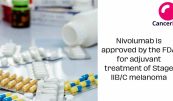Neoadjuvant/ adjuvant pembrolizumab is approved by the FDA for resectable non-small cell lung cancer
Nov 2023: Pembrolizumab (Keytruda, Merck) was granted approval by the Food and Drug Administration (FDA) as a neoadjuvant treatment in combination with platinum-containing chemotherapy and as a post-surgical adjuvant treatment for resectable non-small cell lung cancer (NSCLC) tumours measuring 4 cm or more in diameter, when combined with platinum-containing chemotherapy.
KEYNOTE-671 (NCT03425643), a multicenter, randomized, double-blind, placebo-controlled trial involving 797 patients with AJCC 8th edition resectable Stage II, IIIA, or IIIB NSCLC who had not been previously treated, assessed the drug’s efficacy. Patients undergoing platinum-based chemotherapy were randomized (1:1) to receive pembrolizumab or a placebo every three weeks for four cycles (neoadjuvant treatment).
Subsequently, for a maximum of thirteen cycles (adjuvant treatment), patients were administered either continued single-agent pembrolizumab or a placebo every three weeks. The surgical window and chemotherapy specifics are available at the link to the drug label above.
The primary outcome measures of efficacy were investigator-assessed event-free survival (EFS) and overall survival (OS). The median OS for those receiving placebo was 52.4 months (95% CI: 45.7, NE) and was not attained in the pembrolizumab arm (95% CI: not estimable [NE], NE]; p-value=0.0103). The risk ratio [HR] was 0.72 [95% CI: 0.56, 0.93]; p-value=0.0103]. The median EFS in the placebo arm was 17 months (95% CI: 14.3, 22.0) compared to 17 months in the pembrolizumab arm (95% CI: 34.1 months, NE) (HR 0.58 [95% CI: 0.46, 0.72]; p-value=0.0001).
The adverse reactions most frequently reported by 20% or more of the patients in KEYNOTE-671 were as follows: nausea, fatigue, neutropenia, anaemia, constipation, decreased appetite, decreased white blood cell count, musculoskeletal pain, rash, congestion, vomiting, diarrhoea, and dyspnea.
A comparatively lower rate of adverse reactions prevented surgery for 6% of patients in the pembrolizumab arm who received neoadjuvant treatment, as opposed to 4.3% in the placebo arm. In addition, 3.1% of patients who received neoadjuvant treatment and surgery in the pembrolizumab arm experienced surgical delays as compared to 2.5% in the placebo arm. The safety information pertaining to the neoadjuvant and adjuvant phases can be found in the drug label link provided above.
Pembrolizumab is prescribed at a dosage of 200 mg every 3 weeks or 400 mg every 6 weeks. When administered on the same day as chemotherapy, pembrolizumab should be administered beforehand.
Dr. Nishant Mittal is a highly accomplished researcher with over 13 years of experience in the fields of cardiovascular biology and cancer research. His career is marked by significant contributions to stem cell biology, developmental biology, and innovative research techniques.
Research Highlights
Dr. Mittal's research has focused on several key areas:
1) Cardiovascular Development and Regeneration: He studied coronary vessel development and regeneration using zebrafish models1.
2) Cancer Biology: At Dartmouth College, he developed zebrafish models for studying tumor heterogeneity and clonal evolution in pancreatic cancer.
3) Developmental Biology: His doctoral work at Keio University involved identifying and characterizing medaka fish mutants with cardiovascular defects.
4) Stem Cell Research: He investigated the effects of folic acid on mouse embryonic stem cells and worked on cryopreservation techniques for hematopoietic stem cells.
Publications and Presentations
Dr. Mittal has authored several peer-reviewed publications in reputable journals such as Scientific Reports, Cardiovascular Research, and Disease Models & Mechanisms1. He has also presented his research at numerous international conferences, including the Stanford-Weill Cornell Cardiovascular Research Symposium and the Weinstein Cardiovascular Development Conference.
In summary, Dr. Nishant Mittal is a dedicated and accomplished researcher with a strong track record in cardiovascular and cancer biology, demonstrating expertise in various model systems and a commitment to advancing scientific knowledge through innovative research approaches.
- Comments Closed
- November 24th, 2023






adjuvant PD-1 inhibitor, FDA breakthrough lung cancer therapy, Keytruda lung cancer surgery, neoadjuvant immunotherapy NSCLC, NSCLC survival rate improvement, pembrolizumab NSCLC approval, perioperative immunotherapy, Resectable lung cancer treatment
CancerFax is the most trusted online platform dedicated to connecting individuals facing advanced-stage cancer with groundbreaking cell therapies.
Send your medical reports and get a free analysis.
🌟 Join us in the fight against cancer! 🌟
Привет,
CancerFax — это самая надежная онлайн-платформа, призванная предоставить людям, столкнувшимся с раком на поздних стадиях, доступ к революционным клеточным методам лечения.
Отправьте свои медицинские заключения и получите бесплатный анализ.
🌟 Присоединяйтесь к нам в борьбе с раком! 🌟